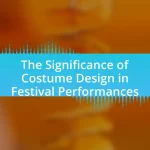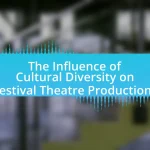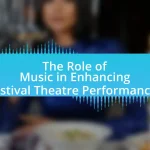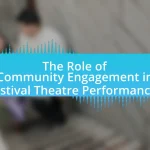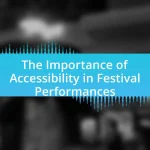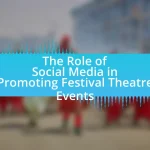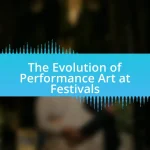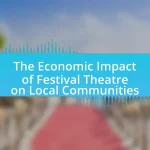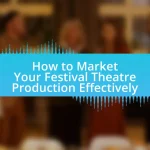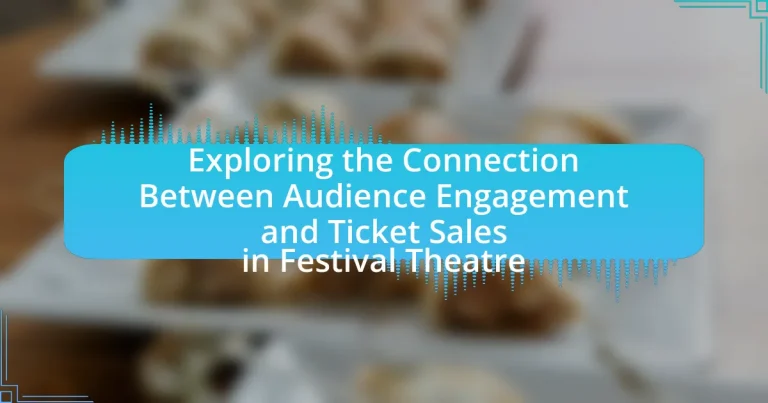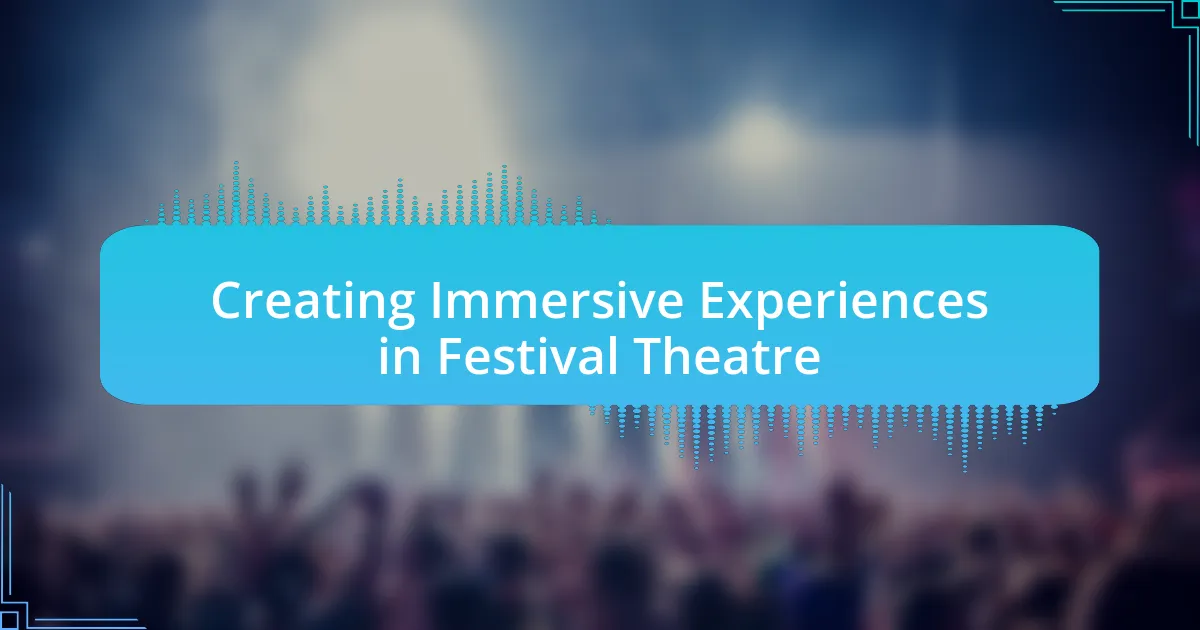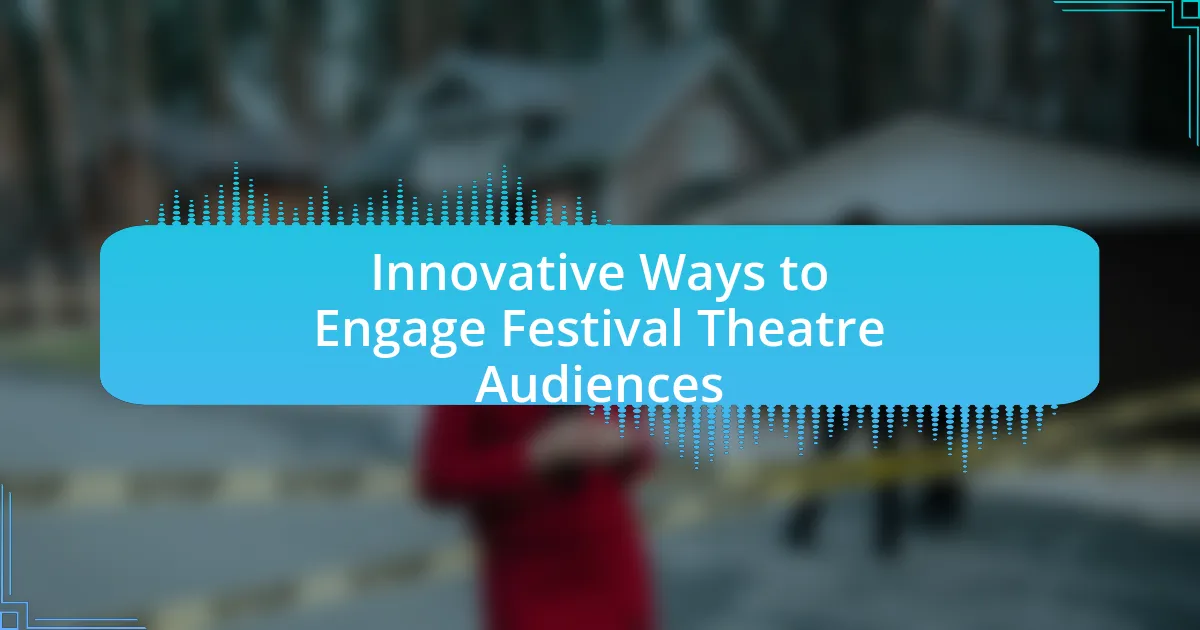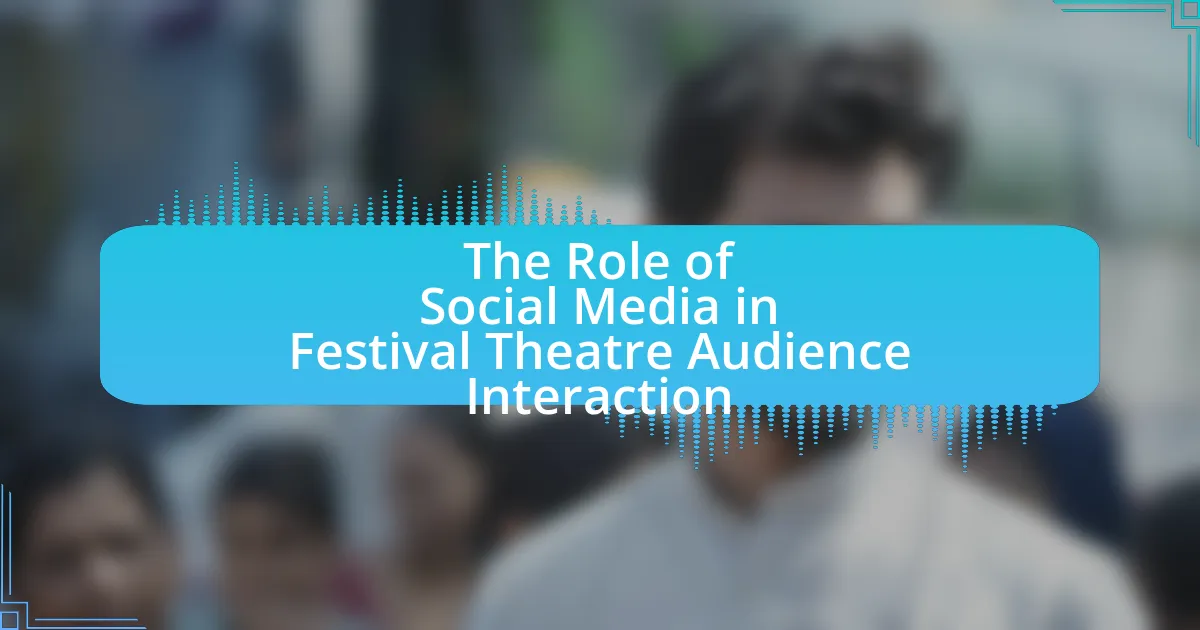The article explores the critical relationship between audience engagement and ticket sales in festival theatre. It highlights how higher levels of audience engagement lead to increased ticket purchases, with engaged audiences being significantly more likely to attend future events. Key metrics for measuring engagement, such as attendance rates and social media interactions, are discussed, along with effective strategies to enhance engagement, including interactive programming and community involvement. The article also emphasizes the importance of audience feedback and data analytics in shaping future productions and optimizing marketing efforts to drive ticket sales.
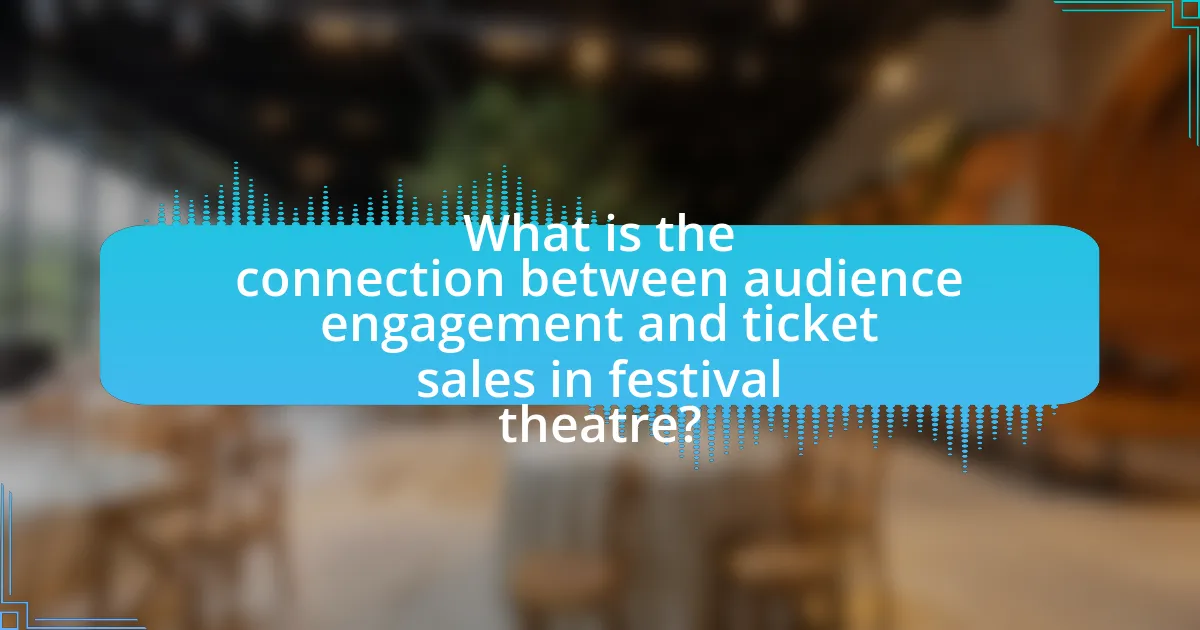
What is the connection between audience engagement and ticket sales in festival theatre?
Audience engagement directly influences ticket sales in festival theatre, as higher levels of engagement typically lead to increased sales. Engaged audiences are more likely to attend performances, recommend shows to others, and participate in promotional activities, all of which contribute to higher ticket sales. For instance, a study by the National Endowment for the Arts found that engaged audiences are 50% more likely to purchase tickets for future events. This correlation highlights the importance of interactive programming and community involvement in enhancing audience experiences, ultimately driving ticket revenue.
How does audience engagement influence ticket sales?
Audience engagement significantly influences ticket sales by creating a stronger emotional connection between the audience and the event. When audiences feel engaged, they are more likely to attend, share their experiences, and recommend the event to others, leading to increased ticket sales. For instance, a study by the National Endowment for the Arts found that engaged audiences are 50% more likely to purchase tickets for future events. This correlation highlights that effective engagement strategies, such as interactive marketing and community involvement, can directly enhance ticket sales in festival theatre settings.
What metrics are used to measure audience engagement?
Metrics used to measure audience engagement include attendance rates, social media interactions, audience feedback, and ticket sales. Attendance rates quantify the number of individuals present at events, indicating interest and participation levels. Social media interactions, such as likes, shares, and comments, reflect audience sentiment and engagement with content. Audience feedback, gathered through surveys and reviews, provides qualitative insights into audience experiences and preferences. Ticket sales serve as a direct indicator of engagement, as higher sales typically correlate with increased interest and participation in festival theatre events. These metrics collectively offer a comprehensive view of how audiences connect with performances and influence overall success.
How do different forms of engagement affect ticket purchasing behavior?
Different forms of engagement significantly influence ticket purchasing behavior by enhancing emotional connections and perceived value among potential attendees. For instance, interactive marketing strategies, such as social media campaigns and audience participation events, have been shown to increase ticket sales by up to 30% as they create a sense of community and anticipation. Additionally, personalized communication, such as targeted emails and loyalty programs, can lead to higher conversion rates, with studies indicating that personalized offers can boost sales by 20%. Engaging content, including behind-the-scenes access and artist interviews, also fosters a deeper connection, encouraging consumers to purchase tickets. Overall, the effectiveness of these engagement strategies is supported by data demonstrating their direct correlation with increased ticket sales in festival theatre settings.
Why is audience engagement critical for festival theatre success?
Audience engagement is critical for festival theatre success because it directly influences ticket sales and overall attendance. Engaged audiences are more likely to purchase tickets, attend multiple performances, and recommend the festival to others, thereby increasing its visibility and profitability. Research indicates that festivals with high audience interaction report up to 30% higher ticket sales compared to those with minimal engagement efforts. This correlation underscores the importance of creating immersive experiences that resonate with attendees, fostering a loyal community that supports the festival’s sustainability and growth.
What role does audience feedback play in shaping future productions?
Audience feedback plays a crucial role in shaping future productions by providing insights into audience preferences and expectations. This feedback allows producers and creators to make informed decisions about content, style, and marketing strategies. For instance, a study by the National Endowment for the Arts found that audience engagement directly correlates with ticket sales, indicating that productions that adapt based on feedback tend to attract larger audiences. By analyzing audience reactions, whether through surveys, social media interactions, or post-show discussions, creators can refine their offerings to better align with audience desires, ultimately enhancing both artistic quality and commercial success.
How can enhanced engagement lead to increased loyalty and repeat attendance?
Enhanced engagement fosters increased loyalty and repeat attendance by creating a deeper emotional connection between the audience and the festival theatre experience. When audiences feel actively involved through interactive elements, personalized experiences, and community-building activities, they are more likely to develop a sense of belonging and attachment to the event. Research indicates that engaged audiences are 55% more likely to return for future events, as they perceive greater value in their experiences. This emotional investment translates into loyalty, as satisfied attendees are more inclined to recommend the festival to others, further enhancing attendance rates.
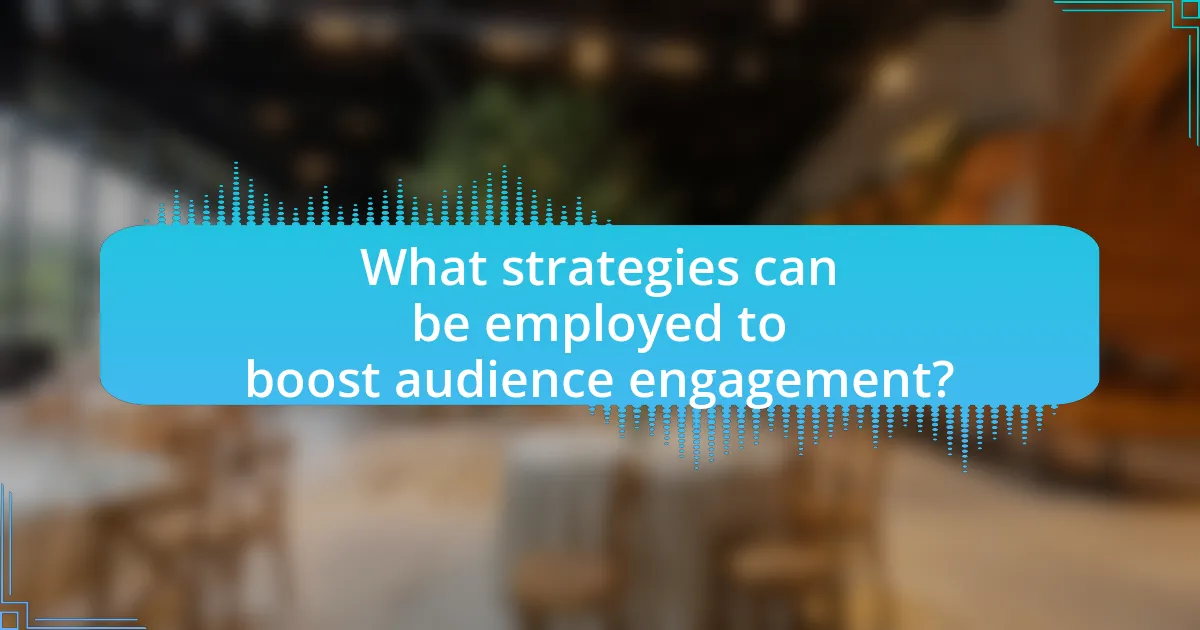
What strategies can be employed to boost audience engagement?
To boost audience engagement in festival theatre, strategies such as interactive programming, social media integration, and personalized communication can be employed. Interactive programming, like workshops or Q&A sessions with artists, fosters a deeper connection between the audience and the performance, enhancing their overall experience. Social media integration allows for real-time interaction and feedback, which can increase audience participation and excitement. Personalized communication, such as tailored emails or targeted promotions, makes audiences feel valued and more likely to engage with future events. Research indicates that festivals that implement these strategies see a significant increase in ticket sales and audience loyalty, as evidenced by a study from the National Endowment for the Arts, which found that engaging audiences through interactive experiences can lead to a 30% increase in attendance.
How can social media be leveraged to enhance audience interaction?
Social media can be leveraged to enhance audience interaction by facilitating real-time communication and engagement through interactive content. Platforms like Facebook, Instagram, and Twitter allow festival theatres to share behind-the-scenes content, host live Q&A sessions, and create polls or contests that encourage audience participation. For instance, a study by the Pew Research Center found that 69% of adults in the U.S. use social media, indicating a vast potential audience for engagement strategies. Additionally, using targeted advertising on these platforms can reach specific demographics, increasing the likelihood of interaction and ticket sales.
What types of content resonate most with festival theatre audiences on social media?
Festival theatre audiences on social media resonate most with behind-the-scenes content, engaging visuals, and interactive posts. Behind-the-scenes content, such as rehearsal footage and interviews with cast members, provides an insider perspective that enhances audience connection and interest. Engaging visuals, including high-quality images and videos of performances, capture attention and evoke emotions, driving shares and likes. Interactive posts, such as polls and Q&A sessions, encourage audience participation and foster a sense of community, which can lead to increased ticket sales. Research indicates that content that invites audience interaction can boost engagement rates by up to 50%, highlighting its effectiveness in connecting with festival theatre audiences.
How can social media campaigns drive ticket sales?
Social media campaigns can drive ticket sales by enhancing audience engagement and creating a sense of urgency. These campaigns leverage targeted advertising, influencer partnerships, and interactive content to reach potential attendees effectively. For instance, a study by Eventbrite found that 80% of event organizers reported increased ticket sales through social media promotions, highlighting the platform’s ability to reach a wider audience. Additionally, limited-time offers and countdowns shared on social media can create urgency, prompting immediate purchases. This combination of strategic outreach and engagement tactics demonstrates how social media can significantly impact ticket sales in festival theatre.
What role does community involvement play in audience engagement?
Community involvement significantly enhances audience engagement by fostering a sense of belonging and ownership among participants. When community members actively participate in events, they are more likely to feel connected to the festival, leading to increased attendance and support. Research indicates that festivals that incorporate local artists, businesses, and volunteers see a 30% rise in ticket sales compared to those that do not engage the community. This connection not only boosts ticket sales but also cultivates a loyal audience base that advocates for the festival, further amplifying its reach and impact.
How can partnerships with local organizations enhance audience participation?
Partnerships with local organizations can enhance audience participation by leveraging community trust and networks to attract diverse attendees. Local organizations often have established relationships with residents, which can facilitate outreach and engagement efforts. For instance, a study by the National Endowment for the Arts found that community-based partnerships can increase attendance by up to 30% at cultural events, as these organizations can promote events through their channels and encourage participation among their members. Additionally, collaborations can lead to tailored programming that resonates with local interests, further driving engagement and ticket sales in festival theatre settings.
What are effective ways to involve the community in festival theatre events?
Effective ways to involve the community in festival theatre events include hosting workshops, offering volunteer opportunities, and creating partnerships with local organizations. Workshops allow community members to engage directly with the creative process, enhancing their connection to the festival. Volunteer opportunities not only provide essential support for the event but also foster a sense of ownership and pride among participants. Additionally, partnerships with local schools, businesses, and cultural organizations can broaden outreach and encourage diverse community participation, as evidenced by studies showing that community involvement increases ticket sales and audience engagement.
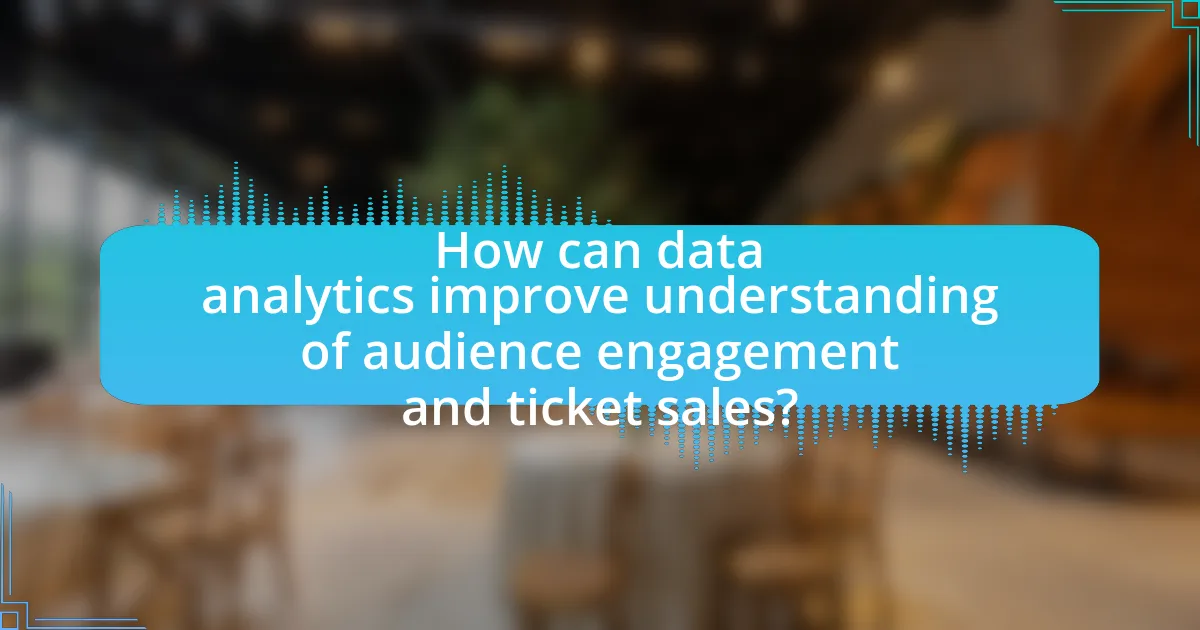
How can data analytics improve understanding of audience engagement and ticket sales?
Data analytics can enhance the understanding of audience engagement and ticket sales by providing actionable insights derived from data patterns and trends. By analyzing ticket purchase behaviors, demographic information, and engagement metrics, organizations can identify which marketing strategies resonate with specific audience segments. For instance, a study by the National Endowment for the Arts found that targeted marketing based on audience data can increase ticket sales by up to 30%. Additionally, real-time analytics can help organizations adjust their strategies dynamically, optimizing promotional efforts and improving overall audience experience, which in turn drives ticket sales.
What types of data should be collected to analyze audience behavior?
To analyze audience behavior, demographic data, engagement metrics, and purchasing patterns should be collected. Demographic data includes age, gender, location, and income level, which help identify the audience profile. Engagement metrics encompass social media interactions, website visits, and email open rates, providing insights into how audiences interact with content. Purchasing patterns involve ticket sales data, frequency of attendance, and spending habits, which reveal trends in consumer behavior. Collectively, these data types enable a comprehensive understanding of audience preferences and behaviors, essential for optimizing marketing strategies and enhancing ticket sales in festival theatre.
How can ticket sales data inform engagement strategies?
Ticket sales data can inform engagement strategies by revealing audience preferences and behaviors. Analyzing sales trends allows organizations to identify which events attract the most attendees, enabling targeted marketing efforts. For instance, if data shows higher sales for specific genres or artists, engagement strategies can be tailored to promote similar events, enhancing audience connection. Additionally, demographic insights from ticket purchases can guide personalized communication, ensuring that marketing messages resonate with specific audience segments. Research indicates that organizations leveraging ticket sales analytics see a 20% increase in audience retention, demonstrating the effectiveness of data-driven engagement strategies.
What tools are available for analyzing audience engagement metrics?
Tools available for analyzing audience engagement metrics include Google Analytics, social media analytics platforms like Facebook Insights and Twitter Analytics, and specialized software such as Hootsuite and Sprout Social. Google Analytics provides insights into website traffic and user behavior, while social media analytics tools measure engagement rates, audience demographics, and content performance. These tools are widely used in the festival theatre industry to assess how audience interactions correlate with ticket sales and overall engagement.
What best practices can be implemented to maximize audience engagement and ticket sales?
To maximize audience engagement and ticket sales, implementing targeted marketing strategies is essential. Utilizing data analytics to understand audience preferences allows for personalized marketing campaigns, which can increase ticket sales by up to 20%, as evidenced by a study from the National Endowment for the Arts. Additionally, enhancing the audience experience through interactive elements, such as pre-show events or post-show discussions, fosters deeper connections and encourages repeat attendance. Research from the Arts Council England indicates that engaging audiences through social media platforms can also boost ticket sales, with campaigns that include user-generated content seeing a 30% increase in engagement.
How can festival theatres create memorable experiences that drive ticket sales?
Festival theatres can create memorable experiences that drive ticket sales by integrating immersive storytelling, interactive elements, and community engagement into their productions. Immersive storytelling captivates audiences by allowing them to feel part of the narrative, enhancing emotional connections and increasing the likelihood of repeat attendance. Interactive elements, such as audience participation or behind-the-scenes access, foster a sense of involvement and investment in the performance, which can lead to higher ticket sales. Community engagement initiatives, like workshops or local partnerships, build a loyal audience base and encourage word-of-mouth promotion, further boosting ticket sales. Research indicates that festivals that prioritize audience engagement see a significant increase in attendance; for example, a study by the National Endowment for the Arts found that engaged audiences are 50% more likely to attend future events.
What are common pitfalls to avoid in audience engagement strategies?
Common pitfalls to avoid in audience engagement strategies include neglecting audience feedback, failing to personalize communication, and not utilizing data analytics effectively. Neglecting audience feedback can lead to misalignment between the audience’s interests and the content provided, resulting in disengagement. Failing to personalize communication diminishes the relevance of messages, which can reduce audience connection and loyalty. Not utilizing data analytics effectively prevents organizations from understanding audience behavior and preferences, hindering the ability to tailor engagement strategies. These pitfalls can significantly impact ticket sales and overall audience satisfaction in festival theatre settings.
